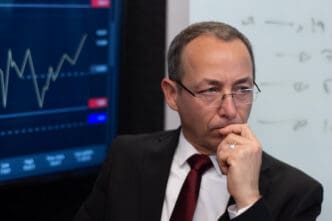Following the recent announcement from the Trump administration regarding a 90-day suspension of most reciprocal tariffs, stock markets initially rallied. However, experts urge caution, warning that the optimism surrounding this temporary reprieve may be premature. The announcement comes on the heels of a significant market downturn, with the S&P 500 experiencing a nearly 12% drop over four trading days due to fears surrounding unexpectedly high tariffs, raising concerns about a potential recession driven by these economic policies.
The 90-day pause in tariffs has been likened to a temporary relief that prevents immediate economic paralysis. Analysts emphasize that had the tariffs been enforced, business investment, hiring, pricing, and expansion could have been severely impacted. Despite the initial rally that saw the S&P 500 rebound nearly 10%, market sentiment remains fragile, with further declines observed shortly after.
Concerns have also been raised about the implications for Treasury yields. Traditionally viewed as a safe haven for investors, Treasuries may become less attractive amidst fears of inflation driven by tariffs, leading to potential sell-offs by international investors and worsening supply-demand issues in the bond market.
Amid this backdrop, the Federal Reserve has indicated that an economic slowdown linked to tariffs would not necessarily trigger immediate rate cuts, though the tariff pause has eased some pressure on the central bank. However, maintaining a balance will be crucial, as the Fed must monitor both inflationary pressures arising from tariffs and support an economy that could be adversely affected.
Should tariffs resume after the 90-day hiatus, experts warn of two potential outcomes that could complicate the Federal Reserve’s actions. If broad price increases from tariffs occur, American consumers may reduce spending, potentially leading businesses to adjust their workforce sizes, which could trigger a recession. While stock market declines alone may not alarm the Fed, rising unemployment could prompt an earlier-than-planned rate cut.
In light of these uncertainties, financial advisors recommend a cautious, long-term approach to investing. They suggest maintaining diversified portfolios and emergency funds to weather potential economic fluctuations. Additionally, changes in the Federal Reserve’s rate policy could significantly impact fixed-income investors, with some experts advising that those anticipating faster rate declines consider purchasing bonds, which could appreciate in value if interest rates fall more sharply than expected. Overall, the current financial landscape remains complex, characterized by cautious optimism intertwined with significant risks.
Your World Now
The ongoing tariff turmoil and its impact on financial markets underscore the complexities of navigating an unpredictable economic landscape. For consumers and businesses alike, the 90-day suspension offers a temporary reprieve but also raises questions about future economic policies and their implications.
For everyday consumers, the potential for increased costs due to tariffs may affect budgeting and spending decisions. Businesses may face uncertainty in investment and hiring, affecting job opportunities and economic growth. The Federal Reserve’s response to these challenges will play a crucial role in shaping the U.S. economy’s trajectory and influencing future interest rates, impacting borrowing costs for everything from mortgages to business loans.







